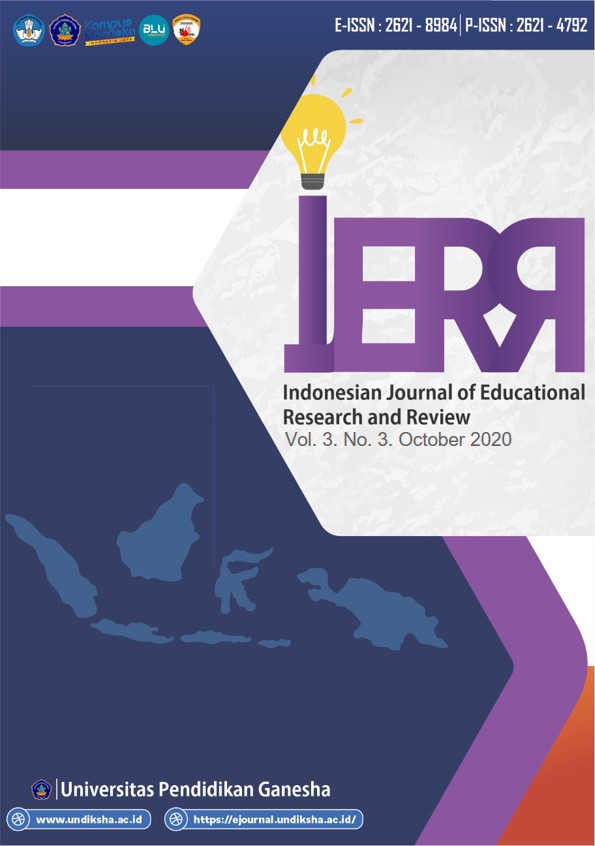The Process of Strengthening Reading Interest in Students Through School Literacy Movement Activities
DOI:
https://doi.org/10.23887/ijerr.v3i3.27809Keywords:
Reading, Literacy, School Literacy MovementAbstract
Reading interest in Indonesian students is still relatively low based on data from the Central Bureau of Statistics (BPS). In 2018 reading levels ranging from reading newspapers, in the countryside shows 7.43 and in urban 22.68 and rural and urban areas 15.06. Reading textbooks in rural areas also showed a figure of 19.03 and in urban 21.95 and rural and urban 20.49. This study explores the planning, implementation, and evaluation and supporting and inhibitory factors in strengthening reading interest through the School Literacy Movement's activities. This research uses a qualitative descriptive research method which is a research method that aims to describe phenomena that occur objectively. The results show that this School Literacy Movement activity provides excellent benefits for the school and students. It started from the increased interest in reading and many characters' education values such as discipline, and responsibility gained from the activity.
References
Antasari, I. W. (2017). Implementasi Gerakan Literasi Sekolah Tahap Pembiasaan di MI Muhammadiyah Gandatapa Sumbang Banyumas. Libria, 9(1). https://www.jurnal.ar-raniry.ac.id/index.php/libria/article/view/1680
Aswat, H. (2020). Analisis Gerakan Literasi Pojok Baca Kelas Terhadap Eksistensi Dayabaca Anak di Sekolah Dasar. Jurnal Basicedu, 4(1), 70-78. https://doi.org/10.31004/basicedu.v4i1.302
Azis, A. (2018). Implementasi Gerakan Literasi Sekolah Pada Pembelajaran Bahasa Indonesia di Sekolah Dasar. Autentik: Jurnal Pengembangan Pendidikan Dasar, 2(1), 57-64. https://autentik.stkippgrisumenep.ac.id/index.php/autentik/article/view/22
Batubara, H. H., & Ariani, D. N. (2018). Implementasi Program Gerakan Literasi Sekolah di Sekolah Dasar Negeri Gugus Sungai Miai Banjarmasin. JPsd (Jurnal Pendidikan Sekolah Dasar), 4(1), 15-29. http://dx.doi.org/10.30870/jpsd.v4i1.2965
Dalman. (2013). Keterampilan Membaca. PT RajaGrafindo Persada.
Didiharyono, D., & Qur'ani, B. (2019). Increasing Community Knowledge Through the Literacy Movement. To Maega: Jurnal Pengabdian Masyarakat, 2(1), 17-24. http://dx.doi.org/10.35914/tomaega.v2i1.235
Fadillah, M. & Khoirida, L. M. (2013). Pendidikan Karakter Anak Usia Dini. Ar-Ruzz Media
Fauziah, G., & Lestari, A. W. (2018). Pembudayaan Gerakan Literasi Informasi Siswa Tingkat Sekolah Dasar di Tanggerang Selatan. Edulib, 8(2), 167-179. https://doi.org/10.17509/edulib.v8i2.13490
Hidayah, L. (2017). Implementasi Budaya Literasi di Sekolah Dasar Melalui Optimalisasi Perpustakaan: Studi Kasus di Sekolah Dasar Negeri di Surabaya. JU-ke (Jurnal Ketahanan Pangan), 1(2), 48-58. http://riset.unisma.ac.id/index.php/JU-ke/article/view/791
Hidayat, M. H., & Basuki, I. A. (2018). Gerakan Literasi Sekolah di Sekolah Dasar. Jurnal Pendidikan: Teori, Penelitian, dan Pengembangan, 3(6), 810-817. http://dx.doi.org/10.17977/jptpp.v3i6.11213
Iif & Khoiru. (2011). Strategi Pembelajaran Sekolah Terpadu “Pengaruhnya Terhadap Konsep Pembelajaran”. Prestasi Pustaka.
Kalida, M. & Mursyid, M. (2015). Gerakan Literasi Mencerdaskan Negeri. Aswaja Pressindo.
Kern, R. (2000). Literacy and Language Teaching. Oxford University.
Khotimah, K., & Sa’dijah, C. (2018). Pelaksanaan Gerakan Literasi Sekolah. Jurnal Pendidikan: Teori, Penelitian, dan Pengembangan, 3(11), 1488-1498. http://dx.doi.org/10.17977/jptpp.v3i11.11778
Laksono, K., & Retnaningdyah, P. (2018). Literacy Infrastructure, Access to Books, and the School Literacy Movement in Primary Schools in Indonesia. In IOP Conference Series: Materials Science and Engineering (Vol. 296, No. 1, p. 012045). IOP Publishing.
Pangesti, W. (2016). Desain Induk Gerakan Literasi Sekolah. Kementerian Pendidikan dan Kebudayaan
Rahman, M. & Amri, S. (2013). Strategi & Desain Pengembangan Sistem Pembelajaran. Prestasi Pustakaraya.
Rochman C. (2016). Pengembangan Kompetensi Kepribadian Guru Menjadi Pendidik yang Dicintai dan Diteladani Siswa. Nuansa.
Setiyadi, D. B. P. (2018). E-literary texts: Reading materials for school literacy movement. KnE Social Sciences, 538-545. https://www.knepublishing.com/index.php/Kne-Social/article/view/2716
Silvia, O. W., & Djuanda, D. (2017). Model Literature Based Dalam Program Gerakan Literasi Sekolah. Mimbar Sekolah Dasar, 4(2), 160-171. https://doi.org/10.23819/mimbar-sd.v4i2.7799
Somadayo, S. (2011). Strategi dan Teknik Pembelajaran Membaca. Graha Ilmu
Sugiyono. (2012). Metode Penelitian Pendidikan (Pendekatan Kuantitatif, Kualitatif dan R&D. Alfabeta.
Suyono, S., Harsiati, T., & Wulandari, I. S. (2017). Implementasi Gerakan Literasi Sekolah Pada Pembelajaran Tematik di Sekolah Dasar. Sekolah Dasar: Kajian Teori dan Praktik Pendidikan, 26(2), 116-123. http://dx.doi.org/10.17977/um009v26i22017p116
Teguh, M. (2020). Gerakan Literasi Sekolah Dasar. Jurnal Pendidikan Dasar Flobamorata, 1(2), 1-9. https://training.unmuhkupang.ac.id/index.php/jpdf/article/view/217
Wandasari, Y. (2017). Implementasi Gerakan Literasi Sekolah (GLS) Sebagai Pembentuk Pendidikan Berkarakter. JMKSP (Jurnal Manajemen, Kepemimpinan, dan Supervisi Pendidikan), 2(2), 325-342. http://dx.doi.org/10.31851/jmksp.v2i2.1480
Wandasari, Y., Kristiawan, M., & Arafat, Y. (2019). Policy Evaluation of School’s Literacy Movement on Improving Discipline of State High School Students. International Journal of Scientific & Technology Research, 8(4), 190-198.
Wanelly, W. (2019). Implementasi Kebijakan Gerakan Literasi Sekolah (GLS) Dalam Rangka Menumbuhkan Minat Baca Siswa Di Sekolah Dasar. Jurnal Basicedu, 3(2), 406-413. https://doi.org/10.31004/basicedu.v3i2.19
Wiratsiwi, W. (2020). Penerapan Gerakan Literasi Sekolah Di Sekolah Dasar. Refleksi Edukatika: Jurnal Ilmiah Kependidikan, 10(2), 230-238. https://doi.org/10.24176/re.v10i2.4663
Wulanjani, A. N., & Anggraeni, C. W. (2019). Meningkatkan minat membaca melalui gerakan literasi membaca bagi siswa sekolah dasar. Proceeding of Biology Education, 3(1), 26-31. https://doi.org/10.21009/pbe.3-1.4
Yosal I. (2009). Literasi Media: Apa, Mengapa, Bagaimana. Simbiosa Rekatama Media
Yulianto, B., Jannah, F., Nurhidayah, M., & Asteria, P. (2018, February). The Implementation of School Literacy Movement in Elementary School. In 1st International Conference on Education Innovation (ICEI 2017) (pp. 43-46). Atlantis Press.
Downloads
Published
How to Cite
Issue
Section
License
Authors who publish with the Indonesian Journal of Educational Research and Review (IJERR) agree to the following terms:
- Authors retain copyright and grant the journal the right of first publication with the work simultaneously licensed under a Creative Commons Attribution-ShareAlike 4.0 International License. that allows others to share the work with an acknowledgment of the work's authorship and initial publication in this journal.
- Authors are able to enter into separate, additional contractual arrangements for the non-exclusive distribution of the journal's published version of the work (e.g., post it to an institutional repository or publish it in a book), with an acknowledgment of its initial publication in this journal.
- Authors are permitted and encouraged to post their work online (e.g., in institutional repositories or on their website) prior to and during the submission process, as it can lead to productive exchanges, as well as earlier and greater citation of published work. (See The Effect of Open Access)









